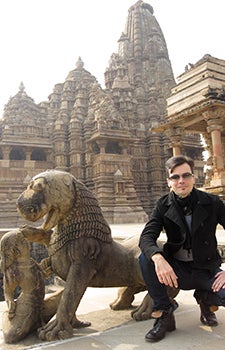
The Unconventional Visionary
Sandwiched between a group of Afghan goat herders and a Sikh businessman, Julian Leuthold inched forward in the long customs line at Delhi airport. It was New Year’s Day 2010, and inside the teeming terminal, Christmas carols were still blasting over the loudspeaker system.
Leuthold had come to explore the country’s nuclear policy as part of a study abroad program. It was his first trip to India and the culture shock was intense. However, the senior, who graduated later that year with a bachelor’s in international relations from USC Dornsife and marketing from USC Marshall School of Business, kept an open heart and mind as he plunged into this unfamiliar new world. That generosity of spirit has repaid him a thousand times over, most notably in his successful career as the founder and CEO of Geoskope, the company behind GetGlobal, the first conference on how to succeed in foreign markets.
Leuthold traces the germ of the idea for GetGlobal back to some unexpected observations he made during that study abroad program.
Two factors helped him adapt to his new life. First — unusually for an expat — he didn’t hang out with many Americans.
“All my friends were Indian and I started to feel very comfortable because I left behind all my assumptions,” he said.
“I tried to live my life in India the way Indians live theirs.”
Second, although no one in his family had ever been to India, his mother and grandmother both had Hindu gurus and Leuthold spent his childhood surrounded by Indian books and artifacts.
“Growing up, I also became familiar with the Tibetan diaspora,” he said. “So it was an easy jump for me to understand India on its own terms because the words, lifestyle and cultural materials had been so familiar to me from a very young age.”
After talking his way into a semester of graduate study at New Delhi’s prestigious Jawaharlal Nehru University, Leuthold’s circle of friends expanded to include numerous Indian executives.
“They kept asking me, ‘Julian, why do American companies come here and make so many mistakes? Why do they repeat the same errors, time and time again?’”
Leuthold didn’t have a ready answer, but couldn’t get the question out of his head.
As he pondered, he began to recognize a pattern. Companies going into India assumed there was a subcontinent full of people just waiting to buy their products. “And that just isn’t the case,” Leuthold said. “If they want to succeed, they need to stop underestimating the sophistication of the country they’re dealing with. American companies need to get to know Indian society and how it works and figure out the best way to meet it — its diverse cultures, structure and history — halfway. Instead, I realized, most business executives are just making it up as they go along and Indians easily recognize this.”
The more he explored, the more Leuthold realized this lack of cultural and institutional fluency was not limited to India.

Julian Leuthold visiting the thousand-year-old temples of Khajuraho during his first trip to India in 2010. Photo by Sarah Browning.
“It’s Brazil, it’s Mexico, it’s the countries of Africa and even Canada. American companies have a really difficult time understanding how things work in most countries,” he said. “That isn’t to say that nobody gets it right, but it’s not made easy.”
A Brookings Institution report confirmed his worst suspicions. “It made plain what I’d been suspecting the entire time: Nobody was pulling together all the necessary participants of trade and investment under one roof.”
Leuthold was determined to change that. In 2011, and later with the help of two of his former USC Dornsife professors, David Karl and Pamela Starr, he founded Geoskope, a company that grew out of his astute observation that businesses with ambitions to expand into foreign markets lacked a one-stop destination to get their questions answered.
“I realized this was a major opportunity to pull together key participants in international trade and investment and build a conversation about how to compete successfully internationally,” Leuthold said.
Held in Los Angeles in October 2016, Geoskope’s first GetGlobal conference drew almost 1,000 registered attendees, including delegations from the United Arab Emirates, Southeast Asia and Colombia, all keen to hear the insights of GetGlobal’s 150 international experts.
“This was the big experiment,” Leuthold said. “Will they mix?” The answer was a resounding yes.
“We had former Mexican intelligence officials sitting next to a virtual reality game producer and executives from an organic beverage company.”
Leuthold finds bringing people together immensely satisfying because he says it helps people to grow, question and see things from different viewpoints.
“What excites me most about what I’m doing is the possibility of being the platform for a conversation on the connection of cultures through trade that’s been going on since tribal Africa but didn’t have a venue until now. That kind of blows my mind when we could be using this conversation to build connections and move the world forward in a positive direction.”
Leuthold was born and raised in L.A., where his father worked in banking and entertainment. The family moved often, so as a child Leuthold constantly had to make new friends.
This feeling of being “forever the outsider,” Leuthold confesses, was his primary motivation for launching his earlier ventures, which later proved to be a model for starting GetGlobal.
“I did it because I felt like a loner. I was really shy.” The irony is not lost on him.
He may have been shy, but Leuthold exemplifies many qualities associated with visionaries: He thinks in untraditional ways; sees opportunities rather than setbacks; combines elements in unexpected ways to create something new; and is unafraid of failure. Plus, he thinks big.
He is also exceptionally open — to diversity, to new people and situations, and to new ideas — a character trait he attributes to his time in India.
“What I love most about India is that its diversity constantly forces you to keep an open mind. In fact, it’s a necessity to survive there.”
Yet, Leuthold says his career has been driven by a feeling of not knowing what to do next.
“To me, everybody always looks like they’ve got it all mapped out. I’ve never been that way, seldom known what I wanted to do past a couple of moves. I just have a feeling of what I like and the direction I want to go.”
Rather than panic, he possesses the rare ability to temporarily withdraw and observe.
“I go through periods in my life where I’ll take six to nine months, eat ramen, keep a low profile and think about things a lot. That sets me off on the next direction.” Taking that time out has been essential, he says, even if he admits that stoking it all is the awareness that during these periods of reflection his peers are advancing in their careers.
“I want to do that too, but I wouldn’t know how to do it like they do, so I have to come up with something else,” he said.
One strategy included living for a year in Washington, D.C., where he attended think tank discussions and sought clients in the area.
“So here are the VSPs — the very serious people — sitting in these really serious places in a very serious town and they’re there to see other very serious people talk about very serious things. Many of them didn’t want to ask questions because they didn’t want to look stupid. Nobody
rewards an executive for saying, ‘I don’t know.’ But there’s beauty in saying, ‘I don’t know.’ It says, ‘I’m ready for more. I’m ready to learn.’”
Leuthold said he spent time wondering, “Gosh, how am I going to ‘out-serious’ the serious people?” Instead,
he started to think about what it would take to make people feel comfortable enough to say, “I don’t know.” Because when it came to India or so many other foreign markets, he knew that most of them didn’t know.
“I thought, maybe they need some music, or a few drinks, or a lighthearted atmosphere where openness is encouraged,” he said. All those elements can be found at GetGlobal, which also owes its style in part to Leuthold’s 2½-year stint working for an online magazine owned by Track Entertainment — organizer of many of Miami’s biggest music festivals. The gig, which he gave up after transferring to USC in Spring 2006, enabled him to gain invaluable experience in concert and event management.
“I thought I’d never use that stuff again, but it turns out I’m applying a lot of music festival concepts to GetGlobal,” said Leuthold, who isn’t shy about borrowing ideas from the rock world to inject an unexpected dose of glamour into the usually sober milieu of international business. For its launch GetGlobal shook up expectations, boasting a live art show, cool lighting design and a cutting-edge music system.
Leuthold’s decision to hold GetGlobal in his hometown is a strategic one.
“In D.C., everyone asks me, ‘Why L.A.?’ The answer is that we can get away with more in L.A.: more humor, more glamour. We can break a few rules. It might not fit in D.C., but here it makes sense and our attendees delight in that.”
Initially drawn to USC by its diversity, Leuthold now finds that the same quality in the international Trojan Family
is of enormous benefit in building his business. Leading Indian economist and alumnus Ajay Shah “couldn’t have been friendlier,” for instance, when Leuthold reached out.
Asked what stood out for him in the support he received from Starr, associate professor (teaching) of international relations, and Karl, former lecturer of international relations, in developing and building his company, Leuthold didn’t miss a beat.
“They cared,” he said. “And they stuck with me. David works with me today while Pamela still lends advice.”
Leuthold remembers Starr’s class on security and economics, which he took his last semester before going to India.
“It was a political risk analysis class that tied everything together,” he said. “I wouldn’t be able to do what I’m doing now without that kind of foundation.”
Leuthold’s vision for GetGlobal is ambitious. “One day, it will draw 80,000 people to downtown L.A.,” he said with a grin.
His confidence, however, is tempered by humility.
“The standards in international business, policy and economics are exceptionally high and you can’t just BS your way through that. You have to be tremendously good — inside and out — to parade on in with a circus behind you. Am I there? Absolutely not. It’s an ongoing struggle every day to make myself better, but I think the process of having no footholds, no place to rest anything, has helped me.”
Read more stories from USC Dornsife Magazine’s Spring/Summer 2017 issue >>